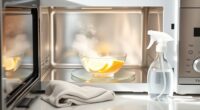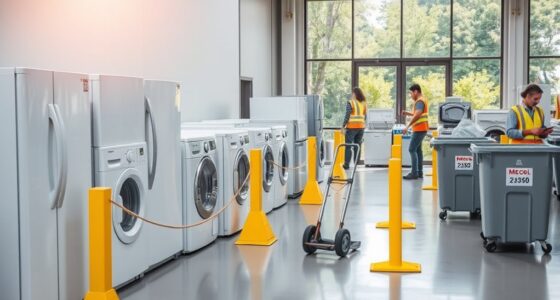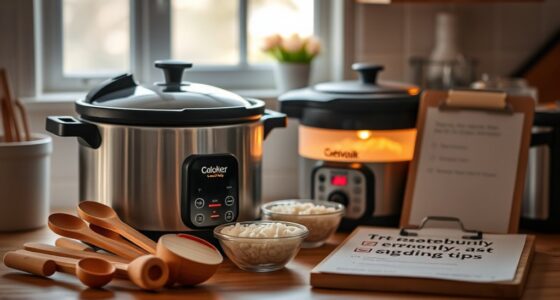To create an effective appliance-maintenance schedule, start with weekly tasks like wiping down appliances, checking for unusual noises, and cleaning filters. Monthly, focus on cleaning lint filters, defrosting freezers, and inspecting hoses for leaks. Annually, schedule professional inspections, replace worn parts, and perform extensive cleaning. Keeping track of these tasks helps prevent breakdowns and boosts efficiency. If you keep working on this plan, you’ll discover more tips to keep your appliances in top shape.
Key Takeaways
- Categorize maintenance tasks into weekly, monthly, and annual routines based on appliance needs.
- Use troubleshooting tips to identify and address minor issues during each maintenance interval.
- Schedule professional inspections annually and perform detailed cleaning to ensure optimal performance.
- Keep detailed logs of maintenance activities to track appliance health and plan future tasks.
- Regularly review appliance performance patterns to adjust your maintenance schedule proactively.

Maintaining your appliances regularly can extend their lifespan and prevent costly repairs. When you develop a consistent maintenance schedule, you guarantee that each appliance runs efficiently, saving you money on energy bills and avoiding unexpected breakdowns. One of the key benefits of regular upkeep is improving energy efficiency. When appliances are clean and functioning properly, they don’t waste energy trying to compensate for dirt, wear, or malfunction. For example, regularly cleaning your refrigerator’s coils or replacing filters in your HVAC system keeps them running smoothly and reduces energy consumption. To make the most of your schedule, familiarize yourself with troubleshooting tips for common issues. Spotting problems early allows you to address minor concerns before they become major repairs, further extending your appliances’ lifespan. Understanding local regulations can also help you stay compliant when performing maintenance or repairs.
Regular appliance maintenance extends lifespan, improves efficiency, and prevents costly repairs through early troubleshooting and routine cleaning.
Creating a weekly maintenance routine might include simple tasks such as wiping down appliances, checking for unusual noises, and ensuring vents or filters are clean. These small steps can help you catch early signs of problems, like a dishwasher that’s not draining properly or a dryer that’s making strange sounds. Troubleshooting tips can guide you in diagnosing these issues, saving you time and money. For instance, if your washing machine isn’t spinning, checking the lid switch or door latch can often solve the problem without calling a repair technician. By dedicating a few minutes each week, you keep your appliances in top shape and prevent minor issues from escalating.
Monthly tasks should focus on more thorough inspections and cleaning. For example, you might clean the lint filter in your dryer, defrost the freezer if necessary, or run a cleaning cycle on your coffee maker. These routines prevent buildup that could strain the appliances or reduce their efficiency. Additionally, inspecting hoses, seals, and connections can prevent leaks or water damage. Incorporate troubleshooting tips to identify potential issues, like checking for unusual odors or leaks, and address them promptly. Regularly reviewing your appliances’ performance helps you recognize patterns and schedule repairs before breakdowns occur, conserving energy and extending their service life. Keeping detailed records can also help you track when certain parts may need replacing.
Annual tasks are more exhaustive and often include professional inspections. This might involve having a heating or cooling system serviced or replacing worn-out parts. Annual maintenance ensures that your appliances operate at peak efficiency, which enhances energy efficiency and can greatly reduce your utility bills. It’s also a good opportunity to review your troubleshooting knowledge, ensuring you’re prepared to handle minor issues that may arise unexpectedly. Keeping a detailed maintenance log can help you track what’s been done and plan future upkeep, making your maintenance schedule more effective. By dedicating time each year to these tasks, you safeguard your appliances’ longevity and ensure they operate efficiently for years to come.
Frequently Asked Questions
How Do I Prioritize Appliances for Maintenance?
You should prioritize appliances that use the most energy or are essential daily, like refrigerators or heating systems, to maximize energy savings and extend their lifespan. Check user manuals for maintenance tips, and schedule regular cleaning and inspections. By maintaining high-priority appliances first, you ensure they’re efficient, save energy, and last longer. This approach helps you make the most of your maintenance efforts and improves your overall energy-saving habits.
What Tools Are Needed for DIY Appliance Repairs?
To tackle DIY appliance repairs, you’ll want to gather some DIY repair basics like screwdrivers, pliers, a multimeter, and a utility knife from common tool kits. These tools help you navigate most repairs smoothly. Having a cordless drill, a wrench set, and safety gear like gloves and goggles also makes the job easier and safer. With the right tools, you’ll confidently handle many appliance issues yourself.
How Can I Track Maintenance History Efficiently?
You can track maintenance history efficiently by using digital tracking tools like spreadsheets or dedicated apps. These tools help you keep detailed maintenance record keeping, including dates, tasks performed, and parts replaced. Set reminders for upcoming maintenance to stay organized and guarantee nothing gets missed. Regularly update your records after each task to maintain an accurate history, making future troubleshooting and scheduling easier.
When Should I Replace Rather Than Repair an Appliance?
Did you know the average appliance lifespan is around 10-15 years? You should replace rather than repair when repair costs surpass 50% of a new unit’s price or if frequent breakdowns disrupt your routine. Keep an eye on replacement indicators like persistent issues, outdated efficiency, or skyrocketing energy bills. When these signs appear, upgrading your appliance can save you money and hassle in the long run.
Are There Eco-Friendly Maintenance Practices?
Yes, you can adopt eco-friendly maintenance practices by using eco-friendly cleaning products that reduce chemical runoff and indoor air pollution. Additionally, focus on energy-efficient upgrades like LED bulbs and ENERGY STAR appliances to lower energy consumption. Regularly clean filters and vents to improve efficiency, which conserves resources. These practices not only protect the environment but also save you money in the long run, making your home more sustainable.
Conclusion
By sticking to a regular maintenance schedule, you can extend your appliances’ lifespan and save money on repairs. Did you know that properly maintained appliances can last 30% longer? That’s like getting three extra years out of your refrigerator or washing machine! So, keep up with your weekly, monthly, and annual tasks—your appliances will perform better, last longer, and save you money in the long run. Stay consistent and enjoy hassle-free appliances.









